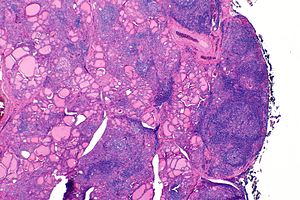Hashimoto's syndrome
| Hashimoto's thyroiditis | |
|---|---|
| Synonyms | Chronic lymphocytic thyroiditis, autoimmune thyroiditis, struma lymphomatosa, Hashimoto's disease |
 |
|
| The thyroid of someone with Hashimoto's thyroiditis as seen with a microscope at low magnification | |
| Specialty | Endocrinology |
| Symptoms | Painless goiter, weight gain, feeling tired, constipation, depression |
| Complications | Thyroid lymphoma. |
| Usual onset | 30–50 years old |
| Causes | Genetic and environmental factors. |
| Risk factors | Family history, another autoimmune disease |
| Diagnostic method | TSH, T4, antithyroid antibodies |
| Differential diagnosis | Graves’ disease, nontoxic nodular goiter |
| Treatment | Levothyroxine, surgery |
| Frequency | 5% at some point |
| Classification |
· ·
|
|---|---|
| External resources |
Hashimoto's thyroiditis, also known as chronic lymphocytic thyroiditis and Hashimoto's disease, is an autoimmune disease in which the thyroid gland is gradually destroyed. Early on there may be no symptoms. Over time the thyroid may enlarge forming a painless goiter. Some people eventually develop hypothyroidism with its accompanying weight gain, feeling tired, constipation, depression, and general pains. After many years the thyroid typically shrinks in size. Potential complications include thyroid lymphoma.
Hashimoto's thyroiditis is thought to be due to a combination of genetic and environmental factors. Risk factors include a family history of the condition and having another autoimmune disease. Diagnosis is confirmed with blood tests for TSH, T4, and antithyroid antibodies. Other conditions that can produce similar symptoms include Graves’ disease and nontoxic nodular goiter.
Hashimoto's thyroiditis is typically treated with levothyroxine. If hypothyroidism is not present some may recommend no treatment while others may treat to try to reduce the size of the goiter. Those affected should avoid eating large amounts of iodine; however, sufficient iodine is required especially during pregnancy. Surgery is rarely required to treat the goiter.
Hashimoto's thyroiditis affects about 5% of the population at some point in their life. It typically begins between the ages of 30 and 50 and is much more common in women than men. Rates of disease appear to be increasing. It was first described by the Japanese physician Hakaru Hashimoto in 1912. In 1957 it was recognized as an autoimmune disorder.
...
Wikipedia
